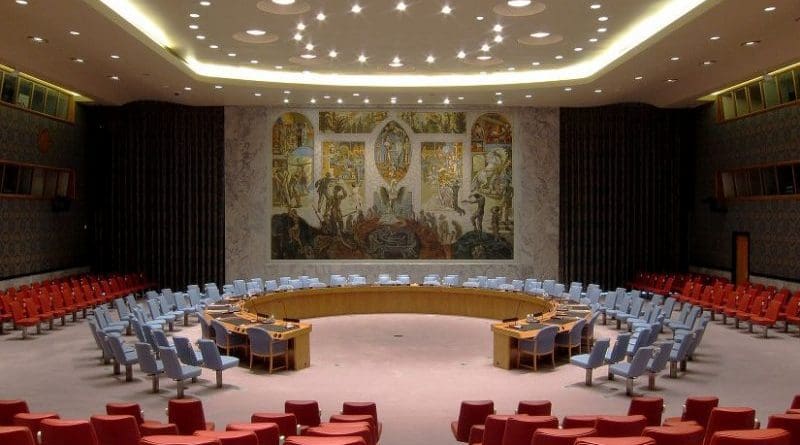UN Secretary-General’s Bold Move: Invoking Article 99 To Address Israeli-Palestinian Conflict – OpEd
War crimes, crimes against humanity, genocide, and ethnic cleansing are among the most heinous crimes in human history. These heinous crimes, defined by their brutality and contempt for human life, strike at the heart of international law and the standards that strive to protect humanity’s purity.
At the core of international law is the lofty goal to develop a society in which justice, dignity, and individual rights are protected without compromise. Nonetheless, the distressing fact is that these foundations are continually under attack by the atrocities of war crimes. The deliberate targeting of civilians, the willful devastation of towns, and the use of chemical weapons are all terrible violations of humanity’s established rules of conduct to uphold, as is being observed in Israel’s war strategy.
The international community, especially the United Nations (UN), has been urged to take more active and effective measures to end the hostilities and resume the peace process. UN Secretary-General Antonio Guterres invoked Article 99 of the UN Charter. This article grants the Secretary-General the authority to bring to the attention of the Security Council any matter which in his opinion may threaten the maintenance of international peace and security.
In his letter to the Security Council, Guterres stated that the fighting “may aggravate existing threats to international peace and security.”
He used Article 99 of the original United Nations Charter, which authorizes him to “bring to the attention of the Security Council any matter which, in his opinion, may threaten the maintenance of international peace and security.”
UN spokesperson Stephane Dujarric said the article had not been used in decades. “We are facing a severe risk of collapse of the humanitarian system,” Guterres said in a statement. The consequences for Palestinians and regional security might be irrevocable, he added, again urging for a humanitarian truce to be proclaimed.
Article 99 is a unique and powerful tool that enables the Secretary-General to play a proactive and preventive role in addressing global crises. However, it has been seldom invoked in the history of the UN, mainly due to the political and practical obstacles that it entails. Firstly, the Secretary-General may face resistance and criticism from the permanent members of the Security Council, especially those who have vested interests or alliances with the parties to the conflict, such as the United States in the case of Israel. Secondly, the Secretary-General may risk undermining his credibility and legitimacy as an impartial and neutral mediator if he is perceived as taking sides or interfering in the internal affairs of sovereign states. Thirdly, the Secretary-General may not have sufficient information and resources to assess the situation and propose solutions, especially in complex and protracted conflicts like the Israeli-Palestinian one. Fourthly, the Secretary-General may not be able to ensure the implementation and follow-up of the Security Council’s decisions if the parties to the conflict are unwilling or unable to comply.
Despite these challenges, there are also some potential benefits and opportunities of invoking Article 99 in the current scenario. Firstly, the Secretary-General may be able to draw the attention and pressure of the international community to the urgency and gravity of the situation, and to mobilize humanitarian and diplomatic assistance for the affected populations. Secondly, the Secretary-General may be able to initiate a dialogue and negotiation process between the parties to the conflict, and to facilitate the involvement of other regional and international actors, such as the Arab League and the European Union, in the peace efforts. Thirdly, the Secretary-General may be able to propose innovative and comprehensive solutions that address the root causes and the long-term aspects of the conflict, such as the occupation, the settlements, the refugees, the security, and the recognition of the two states. Fourthly, the Secretary-General may be able to enhance his role and influence as a global leader and a moral authority, and to demonstrate his commitment and responsibility to the principles and purposes of the UN Charter.
The views and reactions of the different stakeholders to the possible use of Article 99 vary according to their interests and positions. The Palestinian Authority and Hamas, as well as their supporters in the Arab and Muslim world, have welcomed and encouraged the Secretary-General decision to invoke Article 99, as they see it to break the deadlock and the bias of the Security Council, and to achieve international recognition and protection for their rights and aspirations. Israel and its allies, on the other hand, have opposed and rejected the idea of Article 99, as they consider it as an interference and a threat to their sovereignty and security, and as a violation of their bilateral agreements and understandings with the United States and other partners. The other members of the Security Council, as well as the General Assembly and the Human Rights Council, have expressed their concern and condemnation of the violence and the violations of international law, and have called for an immediate ceasefire and a resumption of the peace talks, but have not explicitly endorsed or opposed the invocation of Article 99 by the Secretary-General.
In conclusion, the use of Article 99 by the Secretary-General is a bold and unprecedented move that reflects the urgency and gravity of the Israeli-Palestinian conflict, and that aims to enhance the UN’s role and response to this long-standing and complex issue. However, this decision also entails significant risks and challenges that could jeopardize the Secretary-General’s legitimacy and credibility, and that could worsen the situation and the relations among the parties and the international community. Therefore, the Secretary-General should carefully and strategically assess the implications and outcomes of invoking Article 99 and should seek and maintain the support and cooperation of the relevant actors and stakeholders, to ensure that this decision will contribute to the advancement of peace and security in the region and the world.

